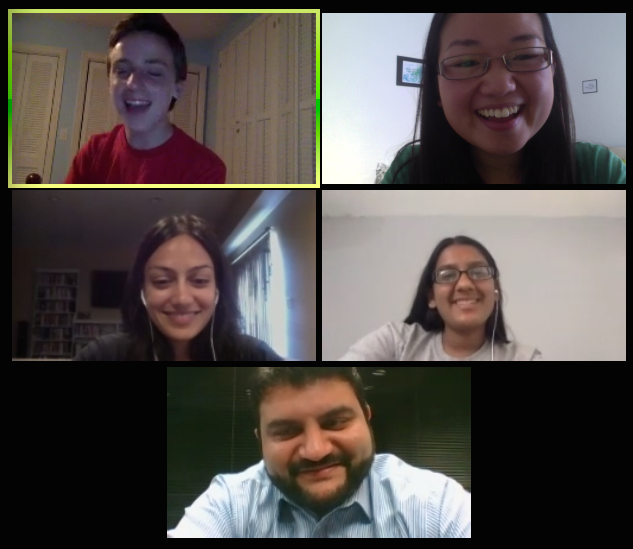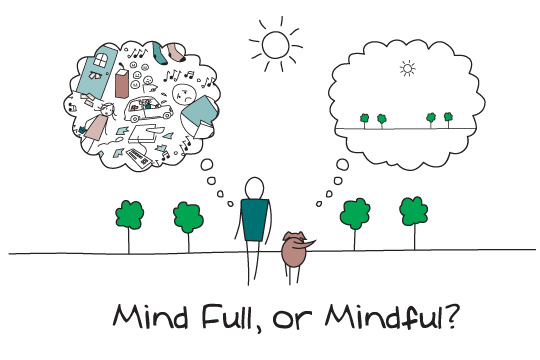ServiceSpace Internship: Week 4 Recap!
Completing four weeks of our summer youth internship, this week’s theme of wisdom was a lot to chew on! One of the most striking things about our written reflections this week was that almost all of us quoted the wise words of others- elders, poets, mentors, etc. This display of humility and willingness to learn shows us that though we may not have all the answers on how to be wise, perhaps we are on the right track ;)

Amit began our circle of sharing this week with a story about his reaction to his daughter breaking her leg (she is fine now and in a super cute cast!). He found that his immediate reaction was one of placing blame and forgetting to show compassion to his wife as well as his daughter. After some reflection, he course-corrected by reassuring his wife that she was not at fault. This type of course-correction takes self-awareness and courage, and we all felt inspired by Amit’s sharing of this vulnerable experience.
In a similar vein, Jacob shared a story about finding two of his campers fighting. Though his initial reaction was to confront the instigator, he took a step and asked himself, ‘What would a wise person do?’ and decided instead to first comfort the child who was upset and then try to find out what happened afterward.
Saheli shared how wonderful it felt to be on the receiving end of a random act of kindness this week! She was on a quest to find blankets with her aunt and after searching quite a bit, they weren’t able to find them. A fellow customer overheard them talking to store staff and offered to take them to a supermarket that she knew had blankets! At first Saheli thought that the fellow customer must have needed blankets herself as well but then she saw her leaving the store after dropping them off and was blown away by the kindness. Though she didn’t have any Smile cards to give to the helpful woman, we encouraged Saheli to pay it forward in her own way :)
Audrey shared an interaction she had with dear friend and inspiring traveler, Zilong. Zilong is currently on a global bicycle pilgrimage and during their recent meet-up, Audrey had so many questions to ask him about his journey but she could barely get any of them in! Zilong was asking so many questions of Audrey and listening so well that Audrey found herself talking for the majority of the conversation. This interaction reminded her that listening itself can be a wise act. She also shared Zilong’s log of multiple forms of capital, in which the overarching theme is: Date: Every day, From: Every corner, Gift: Everything, Story: Every breath
Pranidhi shared a bit of wisdom from her one on one call with Jacob last week, in which he so astutely perceived his own self-deprecating thought patterns in reaction to another’s success. This was particularly moving for Pranidhi because she’s also often hard on herself- perhaps why she and Jacob get along so well ;) Inspired by the Omid Safi article we talked about last week, Pranidhi and her husband started asking each other ‘How’s your haal?” instead of ‘How was your day?’ and noticed a much more authentic exchange develop between the two of them.
As we dove into this week’s theme, Amit inquired about the difference between knowledge and wisdom, and shared this delightful quote by Miles Kington- "Knowledge is knowing that a tomato is a fruit. Wisdom is not putting it in a fruit salad." Saheli understood wisdom as what allows us to apply knowledge and discern whether something is right or wrong, and perceive shades of grey within the black and white. Jacob appreciated Adam Grant’s article, particularly the distinction that age does not necessarily correlate with wisdom. Rather, it is values like kindness, compassion, and patience that make us wise. Pranidhi spoke about how wisdom allows us to surrender to not knowing, abstain from value judgments, and acknowledge the vastness of the universe and the tiny role we play in it.

Amidst all this theory, some question arose- How do we practice wisdom? How do we know when to apply knowledge and when to apply wisdom? Amit shared that most of the wise people he knows have a desire to get in touch with reality. A practice of self-awareness can lead us toward wisdom. To expound upon this point, we asked Saheli and Jacob to share some highlights from this week’s reflection exercise, in which they were asked to write down two things each day that made them happy and two things each day that they wish they’d done differently.
Saheli shared how wonderful it felt to be appreciated by her family, including her cousin and aunt who are visiting. They complimented her on her artwork and her cousin would not leave her side, even standing to wait for her outside the bathroom door! This sweet connection reminded her of this quote by Brandi Snyder- "To the world you may be just one person, but to one person you may be the world." Her regret was not being as effusive with her appreciation toward her family. Upon reflection, she did speak up and express herself more with her cousin and hopes to continue doing that with other members of her family.
Jacob shared his experience of going shoe shopping and how happy the employees at the store made him feel! They had huge smiles on their faces and turned what could have been a bland experience into one that was upbeat and special. This reminded Jacob of the impact our surroundings can have on us. That same day, he regretted bumping into a lady at Whole Foods while grocery shopping. The lady was clearly startled and, though she was understanding afterward, Jacob still felt like he could have been more present and attuned to his surroundings.
We continued our discussion on how to practice and apply wisdom by bringing in humility and kindness. Jacob and Saheli both agreed that kindness is the highest form of wisdom, and that kindness and wisdom often work together- as one develops, so does the other. Audrey brought up a study mentioned in Adam Grant’s article, in which a group of wise people and a group of professionals were asked their thoughts about a 15 year old getting married. Those that scored low on the wisdom scale quickly rushed to judgment and voiced their disapproval of the marriage. Those that scored high on the wisdom scale took into account the possibilities that could have led to such a marriage. Instead of seeing the world in black and white, wise people see the world in shades of grey and have the ability to hold multiple, even opposing, perspectives.
Pranidhi spoke of the importance of practicing this in the face of so many contentious current events. She has a strong point of view about many of these events and is working to consciously place herself in the shoes of those who have opposing views. She’s finding that exercising empathy is challenging stuff, especially when (in Amit’s words) it’s the wrong shoe size!
Amit reiterated the importance of mindfulness as a tool to cultivate self-awareness, which often leads to wisdom. This prompted us to share thoughts on our silent sitting practices. Jacob starts his sits off with a connection to his Jewish spirituality by imagining himself in the presence of others at temple- like a sanctuary- and then thinks about how he can serve throughout the day. He sets some intentions and then lets the mind wander. He’s also noticed that during the silence, he’s able to hear his breath and feel his body more clearly.
Amit shared a story of being yelled at by his boss in stressful work environment. As his boss was yelling at him, he did a body scan and became attuned to all the physiological reactions that were arising. As he became attuned to them, they began to fade away and he felt as if the scene was on mute. He was in a loud, stressful situation but inside, he was calm. This is a great example of how the ability to recognize physiological patterns during our silent sits can help us off the cushion. In response, Jacob shared his recent study of the three theories of emotion.
Saheli shared that the daily sits have made her calmer throughout the day and allowed her to sleep better at night, perhaps because the sitting allows her mind to empty out ahead of time instead of lying on the pillow with lots of thoughts swirling around. During her sits, she often finds herself thinking about the future, whether it be the next day or years from now! When she finds her mind wandering to the distant future, she brings it a bit closer to presence by focusing on the near future.

All this talk about thoughts led Audrey to ask the question- Do thoughts make us heavier? Amit also asked- Instead of focusing on the near future, what if we asked ourselves, How am I now? Pranidhi shared that she also has a future-thinking mind and her technique for coming into presence is bringing her awareness to breath and body. Amit shared the technique of thinking everything through till there’s nothing left to think about. When he first started sitting, this technique was suggested to him by an elder and it helped him to go with the flow of the mind instead of going against the grain.
Our call ended with another insightful question posed by Amit- How do we identify wisdom? Jacob expressed that we can gain wisdom from just about anyone, and that wisdom may show up differently depending on each person, the situation, and the culture. On a personal level, he shared that he is very impressionable and that his challenge has been to find strength when it is called for. Pranidhi shared that there is a distinction between advice and wisdom, and that certain situations call for one over the other. When a student asks her a question, sometimes it’s most appropriate to give advice from a place of knowledge and at other times, it’s more service-oriented to seed an inquiry so that the student can arrive at the answer themselves. This is closer to wisdom.
Audrey reminded us that, as mentioned in Adam Grant’s piece, rules don’t necessarily lead to wisdom. Surrounding ourselves with people we trust goes a long way toward cultivating wisdom. In retrospect, we may at times listen to people who we shouldn’t have but we learn from that and see value in it all. She also shared this story of honoring teachers in all their forms.
Amit shared a beautiful story of a young boy walking along a beach with his grandfather. As they were walking, they saw hundreds of jellyfish on the sand. One by one, the boy began guiding the jellyfish back into the water. The grandfather was puzzled by this endeavor and asked the boy- What are you doing? There are so many jellyfish! You’re not going to be able to pick up all of them so does this even matter? The boy answered by picking up the next jellyfish and saying- It’s going to matter to this one. Jacob astutely observed that in this story, the young boy was wiser than the grandfather.
To conclude our deep dive into wisdom, Amit left us with one final quote- Experience is what you get when you didn’t get what you wanted. Wisdom is what you get after you get a lot of experience. As always, we look forward to integrating the insights and lessons shared on our call into our lives, and we look forward to next week’s theme of energy!
Posted by Pranidhi Varshney on Jun 30, 2016

